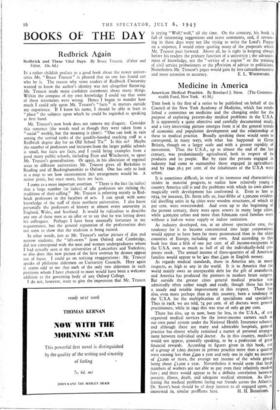BOOKS Of THE DAY
Redbrick Again
IN a rather childish preface to a good book about the newer univer- sities Mr. "Bruce Truscot" is pleased that no one has found out who he is. The reason why some readers of Redbrick University wanted to know the author's identity was not altogether flattering. Mr. Truscot made many confident statements about many things. Within the compass of my own knowledge I could say that some of these statements were wrong. Hence I began to wonder how much I could rely upon Mr. Truscot's " facts " in matters outside my experience. If I knew his name, I should be able at least to " place" the subjects upon which he could be regarded as speaking at first hand.
Mr. Truscot's new book does not remove my disquiet. Consider this sentence (the words read as though they were taken from a " social " weekly, but the meaning is clear): "One can look in vain among the serried ranks of the gaudily-hooded teaching staff at a Redbrick degree day for an Old School Tie." Is this so? Maybe the number of professors and lecturers from the larger public schools is small, but facts are facts, and I could bring examples from a good many public schools, including Eton and Winchester, to upset Mr. Truscot's generalisation. Or again, in his allocation of regional areas to different universities Mr. Truscot gives all Berkshire to- Reading and all Buckinghamshire to Oxford. One has only to look at .a map to see how inconvenient this arrangement would be. A minor point, but once more, facts are facts.
I come to a more important assertion. " There is the fact (in italics) that a large number (in italics) of idle professors are ruining the traditions of their calling." Mr. Truscot is referring mainly to Red- brick professors in the faculties of arts. I can speak with some knowledge of the staff of three northern universities. I also know, personally the professors of history at almost every university in England, Wales, and Scotland. It would be ridiculous to describe any one of these men as an idler or to say that he was letting down his colleagues. Perhaps I have been unusually fortunate in my acquaintance, but the general reputation of the professoriate does not seem to show that the tradition is being ruined.
In other words, just as Mr. Truscot's earlier picture of dim and narrow students, the " left-overs " from Oxford and Cambridge, did not correspond with the men and women undergraduates whom I had actually seen at the universities of Lancashire and Yorkshire, so also does this new picture of the hive overrun by drones appear out of focus. I could go on noticing exaggerations: Mr. Truscot speaks of philistine aldermen on University Councils. Here again it seems odd to me that each of the only two aldermen in such positions whom I have chanced to meet would have been a welcome addition to the governing body of any Oxford College. I do not, however, want to give the impression that Mr. Truscot is crying " Wolf! wolf," all the time. On the contrary, his book is full of interesting suggestions and acute comments, and, if review- ing in these days were not like trying to write the Lord's Prayer on a sixpence, I would enjoy quoting many of the proposals which Mr. Truscot puts fox-ward. Above all, he is right in keeping always before his readers the primary function of a university ; the advance- ment of knowledge, not the " service of a region " or the training of civil service probationers or the provision of advice to politicians. Nonetheless Mr. Truscot's pages would gain by less cantankerousness




























 Previous page
Previous page